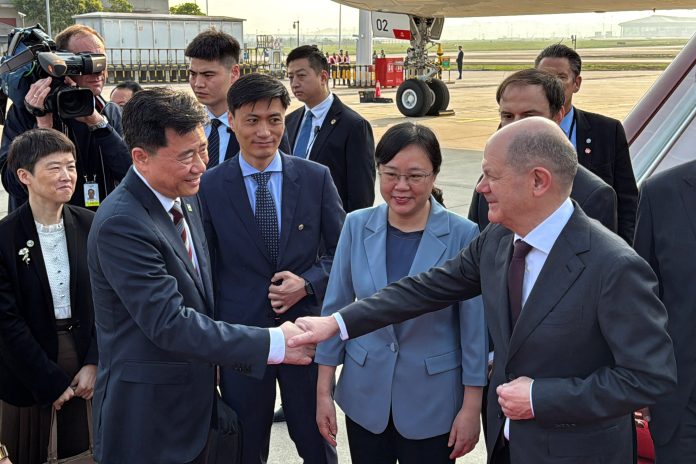Chancellor Olaf Scholz travels to China this weekend, following other EU leaders, in an attempt to develop new economic ties, trade and discuss the conflict in Ukraine, according to RFI.
Olaf Scholz is travelling to China with a large delegation of ministers and business leaders, as both the Chinese and German economies are currently at a low ebb. The focus here is on making new business deals with the Chinese, and he is also expected to raise the issue of Chinese subsidies.
Earlier this week, Brussels launched an investigation into alleged unfair competition involving Chinese wind turbine manufacturers who are flooding the EU market with their products while receiving financial support from Beijing.
Despite, a recent study by the EU Parliament’s Foreign Affairs Committee (AFET) concluded that Brussels’ approach was as follows: “The EU should develop a broader strategic vision and narrative to underpin what up to now has been a more tactical framing of its approach to China and a largely defensive position regarding foreign policy. With the international system in a state of flux and the liberal rules-based order being called into question, the EU must develop a strategic vision of its own preferred international order and a guiding foreign policy vision.”
The EU’s 2019 policy document declared China a “systemic rival,” which led to the start of discussions among EU member states on how to deal with Beijing. Two solutions have been discussed. The first is “decoupling,” which means moving as far away from China as possible and moving economic ties elsewhere. The second option is to prevent sensitive industries from engaging with China, but allow the rest to develop ties.
The German Foreign Ministry, in its latest China strategy published last year, softened the EU’s main strategy and changed its position on China. It says China should still be seen as a “systemic rival” but also as a “partner” and “competitor.”
France has also taken a slightly softer approach to Beijing. Macron visited Beijing last year, where he said in a scandalous interview that Europe should have its own strategic autonomy. France should “avoid the trap [of being] caught in crises which are not ours,” a reference to Taiwan, which is at the core of the current China-US stand-off.
Dutch Prime Minister Mark Rutte also visited China at the end of March. The Netherlands and China have been feuding over Dutch company ASML, one of the world’s leading semiconductor manufacturers, since the company announced earlier this year that it had been banned from exporting “a small number” of its advanced machines to China.
But still there is the Ukraine crisis, which is also a key reason why France, Germany and the Netherlands want to maintain good relations with China, as they hope that Beijing is the only one Russia can listen to.
French foreign minister, Stephane Séjourné said during his visit to China: “We are convinced that there will be no lasting peace if it is not negotiated with the Ukrainians,” mentioning that “no security for Europeans if there is no peace in accordance with international law.”
Regardless of the position of France and Germany, the Dutch Prime Minister particularly emphasised that repeated requests by EU leaders to Beijing to pressure Moscow to end the war, as well as complaints about subsidies for Chinese products and intellectual property rights violations, are not being heeded.
This is particularly important for Europe now, as the possibility of a Trump presidency in November’s US elections could lead to a reduction in US support for NATO and Ukraine if it happens. In such a case, the cost to EU member states of maintaining financial and military support for Kyiv would increase substantially. This leaves China as the only country that can do anything, but which also remains in an “ironclad” relationship with Moscow.
Last month, Wang Yi, meeting the press during the annual session of the Chinese parliament, emphasised the ties between the two countries, saying that “political mutual trust” between the two countries “is deepening.” Vladimir Putin and Chinese leader Xi Jinping have met several times since the beggining of the conflict in Ukraine, and Putin has seen China as an alternative market after Western sanctions hit his oil and gas industry.
